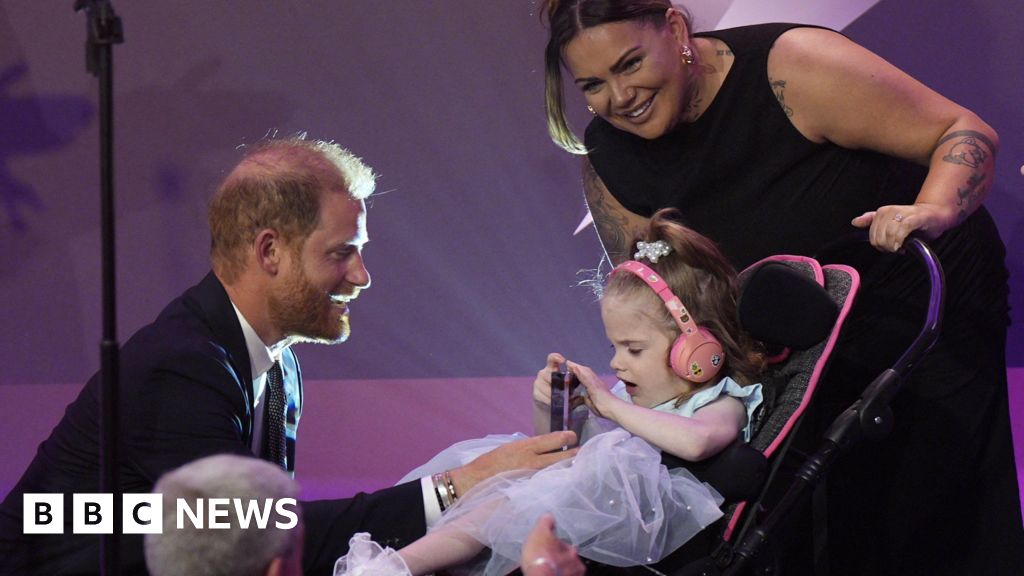Prince Harry returned to the U.K. this week, ostensibly to promote several charitable causes close to his heart.
Unfortunately for him, all anyone in the media wanted to talk about was whether he would see his brother or dad during the trip, which runs until Thursday.
The problem was graphically illustrated when Harry himself joked about the difficulties of “challenging” sibling relationships at the WellChild Awards in London on Monday night. The off-hand quip was soon leading royal news feeds around the world.

The Duke of Sussex, of course, would have liked nothing better than all the attention to be on the boy he was talking to, 17-year-old Declan Bitmead. Declan is a hero. He suffered a horrific reaction to what should have been routine antibiotic treatment that resulted in him losing 96 percent of his skin. He was cared for in a specialist burns clinic while his skin slowly recovered; it’s still very fragile, and he has also lost much of his sight.
But Harry really should have known what would happen if he raised the subject of family dynamics while chatting to him. Asking if his brother “drove him mad” while noting that sharing the same school with your brother—as he did with Prince William—can make it “more challenging” was an unforced error. It felt like Harry fell into the trap of trying so hard not to talk about something that you end up blurting it out at the worst moment possible (in Harry’s case, this means in front of the cameras).

What was supposed to be a joke to put Declan at ease became an invitation for the global media to rehash the details of Harry’s resentment of growing up in his sibling’s shadow, or William once telling him to pretend he didn’t know him at school at Eton.
And here lies Harry’s curse. His family feud sold spectacularly well for him. Now he can’t unsell it.
Having written books and produced films that monetized the conflict, he now finds himself unable to turn the interest off, no matter how much he might want his philanthropy—such as donating more than a million dollars from his own pocket to youth services on Tuesday—to be the story.
While his seven-figure check drew praise in some quarters, others derided it as a self-serving exercise in hypocrisy, noting that it was funded by the very memoir and Netflix deals that tore his family apart.
Harry’s week in Britain so far has felt like a strange flashback. Emerging from a chauffeur-driven SUV at a Nottingham community recording studio, posing for photographers at an awards ceremony in London, it could at first sight have been 2019 again, aside from the extra bald spot.
For all his professed reverence for his grandmother—he made a point of visiting her grave on Monday—it is hard to forget that she was explicitly opposed at the so-called Sandringham Summit in 2020 to Harry and Meghan being “half in, half out” of the royal family.
Yet here he is, living off commercial deals while seeking to resume the charitable patronage of a working royal. It is precisely the hybrid role Elizabeth forbade.
The British media have shown up at Harry’s events, but they are truly only really interested in the question of whether Charles will meet him. On paper, it looks likely: Harry remains his son, he is in London this week for cancer treatment, and reconciliation would cool an open wound and be good optics.
But powerful forces are ranged against a meeting.
William is firmly opposed. Friends say he considers Harry’s memoir an unforgivable betrayal, and that any photo of father and son together would be shamelessly exploited to revive the Sussex brand. William feels vindicated by the Andrew debacle—arguing he was right to cut his uncle off completely while Charles wavered—and is determined not to let history repeat itself.
On this point, William and Sir Clive Alderton, Charles’s principal private secretary, agree. Nicknamed “the Wasp” by Harry, Alderton controls the king’s diary, shields him from unwelcome encounters, and is ferociously protective of the King and Camilla, whom Harry attacked relentlessly in Spare. Courtiers say Alderton’s opposition to Harry is visceral. With the heir and the Wasp aligned in outlook, Charles risks straining two critical relationships—his son and his gatekeeper—if he grants Harry an audience.
Intriguingly, however, there are signs of a softer counterweight. Sir Simon Rycroft, the newly arrived deputy private secretary, is seen as more conciliatory. A seasoned diplomat, he is thought to have been brought in at least partly to smooth tensions with Harry that Alderton has exacerbated.
Rycroft’s reputation for pragmatism has sparked quiet speculation that he could open the door to some kind of managed reconciliation with Harry. Whether his influence can balance Alderton’s sting remains to be seen.
For Charles, the calculation is agonizing. His relationship with William is already tense, scarred by resentment dating back to Diana, and by fundamental differences over how to modernise the monarchy. The king believes in continuity and duty; William disdains pomp and prioritises family life over ceaseless public grind. They barely speak privately, and when they were both in Balmoral last month, The Royalist understands, they spent no private time together at all. Against this backdrop, Charles knows that going against William to meet Harry could blow up what’s left of their fragile bond.
Whether the monarch sees Harry depends less on paternal instincts than on palace politics.
Charles is king, but not all-powerful. Every decision is a balancing act, and at this moment, with Charles looking increasingly frail as he battles cancer, the heir’s voice matters.
Harry, meanwhile, is caught in a limbo of his own making. He wanted out of the institution, but not out of its aura. He wanted independence but still to play a public role. The paradox of his British comeback is that even when he gives, many see only what he has taken away.
Source link

